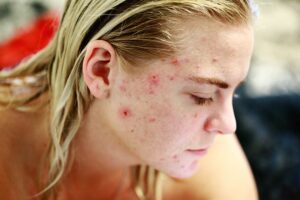
What is acne?
Acne is a skin problem that happens when tiny holes in the skin, called pores, get clogged with oil and dead skin cells. It’s common to get pimples, blackheads, and whiteheads on the face, neck, chest, and back. It is not known for certain what the acne causing culprits are, but there are things you can do that may affect it.
The skin has tiny glands that make oil to keep it healthy, but sometimes they make too much oil. When there is too much oil and dead skin cells, it can block the pores, leading to acne breakouts. Sometimes bacteria can grow in these clogged pores, which makes the acne worse. Acne can be mild or severe, and it can happen to anyone. It’s mostly found in teenagers, but adults can also get it. Many treatments are available to help improve acne, including over-the-counter creams, prescription medications, and lifestyle changes.
Having an acne breakout can be highly frustrating and can often lead us to develop low self-esteem and poor mental health. People tend to forget that the food we eat can play a massive part in our appearance, not just when it comes to weight! That’s why it’s essential to learn what food can affect our skin and why. As well as understanding what food choices we should make to allow our skin to look the best it’s ever been, saying goodbye to acne breakouts once and for all.
There is currently no evidence to show that your diet is related to acne, however making dietary changes could affect it so there’s no harm in making changes as it may make your overall health improve!
Here are the top 5 foods you want to minimise your consumption of to avoid acne flare-ups:
Refined Carbs
One idea is that eating high-sugar foods like processed carbs such as white bread, cereal, and pasta can make your blood sugar spike quickly, causing your body to release insulin. Insulin then causes your body to produce more androgens, which are hormones that can lead to more oil production in your skin. Too much oil can clog up your pores and create pimples. Processed carbs and sugars may result in inflammation in your body, making acne worse.
Processed carbs usually lack fibre and other healthy stuff, which can cause inflammation. If you eat lots of processed carbs, you might have too many harmful bacteria in your gut. This can mess with the good bacteria in your skin and lead to more acne.
Dairy Products
Although there isn’t strong evidence to suggest that dairy products affect acne, one possible explanation is that dairy products contain hormones that can affect the body’s hormone balance and stimulate sebum production, which can contribute to acne. Dairy products can cause inflammation in the body, contributing to acne breakouts. It is important to note that only some who consume dairy products will experience acne breakouts, as many factors are likely contributing to the development of acne, not just the milk in your morning coffee!
Fast Food
Similarly, to dairy products, the relationship between consuming fast food and acne flare-ups is not yet fully understood. Some studies suggest that consuming fast food, such as McDonald’s or Dominoes, on a regular basis could increase the likelihood of acne breakouts. Fast food is often high in refined carbohydrates and sugars, which can cause a spike in blood sugar levels. It is also typically high in saturated and trans fats, which can lead to inflammation in the body, which is a key factor in the development of acne, as it can cause the production of certain hormones that can contribute to acne breakouts.
Whey Protein Powder
There is a lack of research surrounding foods and their relationships with acne, but some studies suggest that consuming whey protein might be affecting your skin. This may be related to the hormones in whey protein powder. Whey protein is made from milk, containing natural hormones that could worsen acne. Consuming whey protein powder can increase the production of insulin and insulin-like growth factor 1 (IGF-1), which can also contribute to acne breakouts. Whey protein powder is also a food that can cause a rapid increase in blood sugar levels, leading to increased insulin production. This increase in insulin and IGF-1 can trigger inflammation, making acne worse.
Foods Rich In Omega-6 Fats
One example of Omega-6 fatty acids is seed oils, such as corn, soybean, sunflower, and safflower oils, which are commonly used in many processed foods, including snacks, baked goods, and fast food. These oils are inexpensive and widely available, making them a common ingredient in the typical Western diet. Omega-6 fatty acids are converted by the body into arachidonic acid, which is a precursor to pro-inflammatory compounds called prostaglandins and leukotrienes. When the body produces too many of these pro-inflammatory compounds, it can lead to an increase in inflammation, which can exacerbate acne.

What foods should I eat to prevent Acne breakouts?
While it’s important to be aware of the foods that might be causing your skin to flare-up, it’s equally important to consume foods that actively protect your skin, helping your body become healthy and prosperous.
Here are some of the main food categories you should integrate into your diet for the best results for your skin:
- Berries – such as blueberries, cherries, blackberries and goji berries are filled with antioxidants which can help prevent acne breakouts.
- Dark leafy greens – like spinach and kale help prevent acne due to them containing high levels of vitamin A which is known to reduce inflammation.
- Seeds – chia seeds, flaxseeds, pumpkin seeds are all a great source of omega 3 which is proven to be anti-inflammatory. Seeds also contain zinc which helps regulate oil production in the skin, therefore reducing the likelihood of developing acne flare-ups.
- Fatty fish – This includes salmon, tuna and mackerel as these types of fish all contain high levels of omega-3 which has been proven to fight acne.
- Turmeric & Ginger – They contain compounds such as curcumin and gingerols that have been shown to have anti-inflammatory and antioxidant properties.
- Whole grains – Such as brown rice, quinoa, barley have a lower glycemic index, which means they are less likely to cause a spike in blood sugar levels and may help regulate insulin production. Spikes in blood sugar levels can contribute to acne by triggering an increase in oil production and inflammation.

What If my acne symptoms won’t go away?
If you’ve been struggling with acne for a while and haven’t seen any improvement despite trying various home remedies, it’s understandable to feel frustrated and helpless. It’s important to remember that acne is a common condition that affects many people, and there are effective treatments available.
It may be time to consult a dermatologist or healthcare professional such as your GP or pharmacist. They can recommend prescription medications or treatments tailored to your specific symptoms.
If you’re worried about your symptoms, e-Surgery has a free to use ‘Ask a Pharmacist’ service that puts you in contact with a medical professional who can give you help and guidance.









